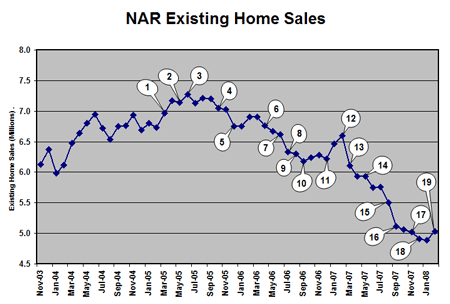Hat tip to RentingInNJ for providing the chart and compling the quotes. Kudos!

1. “There’s no question there is a strong demand for housing from a growing population.” – David Lereah, NAR Chief Economist
2. “For the foreseeable future, the demand for homes will continue to outstrip supply” – Al Mansell, NAR President
3. “We’ve been expecting sales to remain at historically high levels, but this performance underscores the value of housing as an investment and the importance of homeownership in fulfilling the American dream.” – David Lereah, NAR Chief Economist
4. “We are returning to more balanced markets between home buyers and sellers… We feel confident that housing is landing softly as rates continue to rise.” – David Lereah, NAR Chief Economist
5. “This is part of the market adjustment we’ve been discussing, with a soft landing in sight for the housing sector. The level of home sales activity is now at a sustainable level. Overall fundamentals remain solid…” – David Lereah, NAR Chief Economist
6. “Higher interest rates are slowing home sales, but we see this as another sign of a soft landing for the housing sector which remains at historically high levels.” – David Lereah, NAR Chief Economist
“After five years of booming sales, we are now experiencing normal market conditions across most of the country… most owners can expect steadier gains in home values for the foreseeable future.” – Thomas M. Stevens, NAR President
7. “Over the last three months home sales have held in a narrow range, easing to a level that is near our annual projection, which tells us the market is stabilizing” – David Lereah, NAR Chief Economist
8. “Now sellers in many areas of the country are pricing to reflect current market realities. As a result, there could be some lift to home sales, but it’ll likely take some months for price appreciation to rise.” – David Lereah, NAR Chief Economist
9. Existing-home sales stabilized at a sustainable pace in August – NAR
10. “…the worst is behind us as far as a market correction — this is likely the trough for sales. When consumers recognize that home sales are stabilizing, we’ll see the buyers who’ve been on the sidelines get back into the market” – David Lereah, NAR Chief Economist
11. “It looks like we’re moving beyond the low for the housing cycle last fall, and buyers are responding to historically low interest rates and competitive pricing by home sellers. In addition, a tightening inventory of homes on the market is supporting prices.” – David Lereah, NAR Chief Economist
12. “Fundamentals have improved in the housing market and buyers see a window now with historically-low mortgage interest rates and competitive pricing by sellers,” – David Lereah, NAR Chief Economist
13. “We also may be seeing some losses as a result of the subprime fallout. However, this is masking improved fundamentals in the housing market, with lower mortgage interest rates and motivated sellers.” – David Lereah, NAR Chief Economist
14. “Buyers who’ve been on the sidelines may want to take a closer look at current conditions in their area – if they wait for sales to rise, their choices and negotiating position won’t be as good as they are now.” – Pat V. Combs, NAR President
15. “The rise in sales and prices in the Northeast region on a fairly consistent basis in recent months is promising because this was the first region that underwent sales and price weakness after the boom. Now, it appears that it will be the first region to climb back, indicating that other regions could follow a similar path.” – Lawrence Yun, NAR Chief Economist
16. “The unusual disruptions in the mortgage market, including a significant rise in jumbo loan rates, resulted in a fairly high number of postponed or cancelled sales…Once we get through these disruptions, we’ll get a better sense of where the actual market is in late fall as conditions begin to normalize,” – Lawrence Yun, NAR Chief Economist
17. “Existing-Home Sales Rise in November, Market Likely Stabilizing” – NAR
18. “Home sales remain weak despite improved affordability conditions in many parts of the country, but we could get a quick boost to the market if loan limits are raised in combination with the bold cut in the Fed funds rate,” – Lawrence Yun, NAR Chief Economist
19. Existing-Home Sales to Stablize Before Upturn in Second Half of 2008 – NAR

